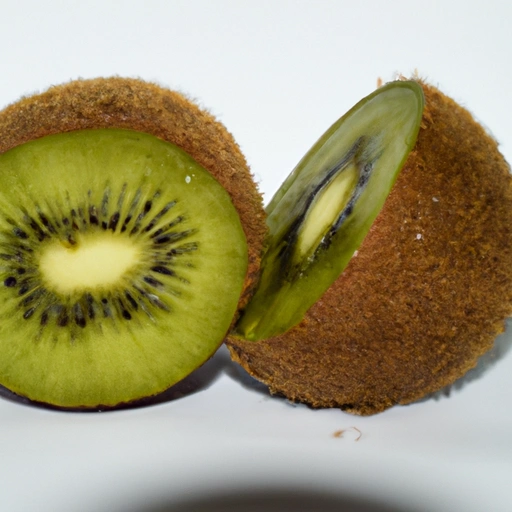Kiwi
Description

The kiwi, also known as kiwifruit or Chinese gooseberry, is a small, brown, fuzzy-skinned fruit with vibrant green or yellow flesh and tiny black seeds. A staple in fruit salads and smoothies, kiwis are not only delightful to the palate but also boast numerous health benefits.
Common uses
Kiwis are commonly used in fruit salads, smoothies, and as a fresh garnish for desserts. They can also be found in savory dishes, where their tangy flavor complements the richness of meats or the flavors of other fruits and vegetables.
Nutritional value
Calories
Average-sized kiwi (about 69 grams) contains approximately 42 calories (175 kJ).
Protein
Each kiwi has about 0.8 grams (0.03 ounces) of protein.
Fat
With only 0.4 grams (0.014 ounces) of fat, kiwi is considered a low-fat food.
Carbohydrates
Kiwis contain about 10 grams (0.35 ounces) of carbohydrates, mainly from natural sugars and dietary fiber.
Vitamins
Kiwis are an excellent source of Vitamin C, providing about 64 milligrams (0.002 ounces), which is more than the daily recommended intake. They also contain Vitamin K, Vitamin E, and a range of B vitamins including folate.
Minerals
These fruits are rich in minerals, particularly potassium, with around 215 milligrams (0.0076 ounces) per fruit, as well as calcium, magnesium, and phosphorus.
Health benefits
Kiwis are known for their high antioxidant content, which can help combat oxidative stress and may lower the risk of chronic diseases. The fiber in kiwis promotes digestive health, while the potassium helps maintain blood pressure levels. Their high vitamin C content supports the immune system, and the various other vitamins and minerals contribute to overall well-being.
Potential risks
While kiwis are healthy for most people, they can cause allergic reactions in some individuals. Those with a latex allergy may also react to kiwifruit due to the presence of certain cross-reactive allergens. Additionally, their high fiber content may cause gastrointestinal discomfort if consumed in excessive amounts.
Common recipes
Kiwis can be used in a variety of recipes, from classic fruit tarts and pavlovas to innovative salsas and chutneys. They are also popular in smoothies, yogurt parfaits, and as a natural sweetener in oatmeals and cereals.
Cooking methods
Typically consumed raw to maintain their nutritional value and fresh taste, kiwis can also be lightly grilled or added to baked goods.
Pairing with other ingredients
Kiwis pair well with other fruits such as strawberries, bananas, and citrus. They also complement the flavors of creamy cheeses, nuts, and are an intriguing addition to salads with leafy greens or grains.
Summary
Kiwi is a nutrient-dense fruit that is as versatile in the kitchen as it is beneficial for health. With its origins in China and popularization in New Zealand, this ingredient has found its way into a variety of dishes around the world, offering both sweet and tangy flavors to delight the palate. Kiwis can be enjoyed in a diverse array of culinary applications and offer significant health advantages, making them a valuable addition to any diet.